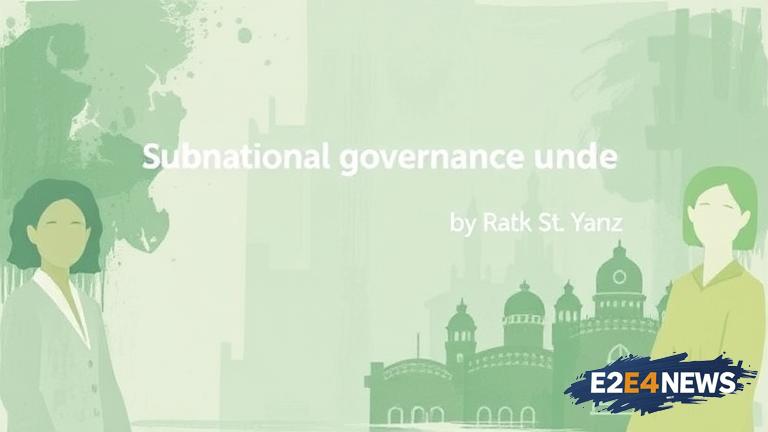The issue of subnational governance has been a topic of discussion in recent times, with many calling for increased scrutiny of state and local governments. This is due to the fact that subnational governments play a crucial role in the delivery of public services and the allocation of resources. However, the lack of transparency and accountability in these governments has led to concerns about corruption, mismanagement, and inefficiency. In many countries, subnational governments are responsible for a significant portion of public expenditure, yet they often lack the necessary checks and balances to ensure that funds are being used effectively. This has resulted in a lack of trust in government and a sense of disconnection between citizens and their leaders. Furthermore, the absence of effective scrutiny has allowed corruption and abuse of power to thrive, undermining the rule of law and democratic institutions. To address these concerns, there is a need for increased scrutiny of subnational governments, including regular audits, performance evaluations, and citizen engagement. This can be achieved through the establishment of independent oversight bodies, such as anti-corruption agencies and parliamentary committees. Additionally, the use of technology, such as open data platforms and social media, can help to increase transparency and accountability in subnational governance. Citizens also have a critical role to play in demanding accountability from their leaders and holding them to account for their actions. This can be done through participation in public consultations, engagement with local media, and support for civil society organizations. Moreover, international organizations and development partners can provide technical assistance and capacity-building support to help subnational governments improve their governance and accountability. The benefits of increased scrutiny of subnational governments are numerous, including improved service delivery, better allocation of resources, and enhanced trust in government. It can also help to reduce corruption and promote economic growth and development. In conclusion, the need for scrutiny of subnational governments is a pressing issue that requires urgent attention. By working together, citizens, governments, and international organizations can help to promote transparency, accountability, and good governance at the subnational level. This, in turn, can help to build stronger, more resilient democracies and promote sustainable development. The importance of subnational governance cannot be overstated, and it is essential that we prioritize this issue in the years to come. Effective scrutiny of subnational governments is critical to ensuring that citizens receive the services they need and that resources are being used efficiently. It is also essential for promoting economic growth, reducing poverty, and improving living standards. In many countries, subnational governments are responsible for delivering critical services, such as healthcare, education, and infrastructure. However, the lack of transparency and accountability in these governments has led to concerns about the quality and accessibility of these services. By increasing scrutiny of subnational governments, we can help to ensure that citizens have access to quality services and that resources are being used to maximum effect. This, in turn, can help to promote economic growth, reduce poverty, and improve living standards. Ultimately, the need for scrutiny of subnational governments is a call to action for citizens, governments, and international organizations to work together to promote transparency, accountability, and good governance at the subnational level.
